Add this eBook to your basket to receive access to all 523 records. Our indexes include entries for the spelling kirkpatrick. In the period you have requested, we have the following 523 records (displaying 401 to 410): These sample scans are from the original record. You will get scans of the full pages or articles where the surname you searched for has been found. Your web browser may prevent the sample windows from opening; in this case please change your browser settings to allow pop-up windows from this site. Steam Engine Makers in England
(1898)
The report of the Steam Engine Makers Society includes accounts of disbursements by all their branches (mostly in England), covering members' sickness, travel and funeral expenses. | Sample scan, click to enlarge
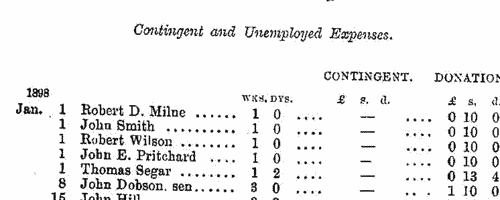
| Residents of Eastburn Place, Helensburgh (1899)
Street directory of Helensburgh from the 22nd edition of the Helensburgh Directory
| Sample scan, click to enlarge
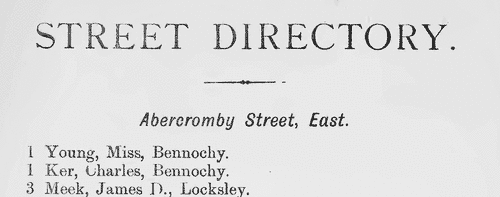
| Boys entering Wellington College in Berkshire
(1900)
Wellington College, near Wokingham, was originally founded for the education of sons of military officers. A register of boys entering the school from First Term 1859 to Michaelmas 1933 was compiled by F. G. Lawrence for the Old Wellingtonian Society. In each entry the boy's name is given in full, in bold, surname first; age at entry (usually 11 to 14); then, in brackets, the name of the dormitory or house to which he belonged, in italics, with the years of his stay; then his father's name (usually surname and initials, but not christian name) with military decorations where appropriate. School prefects and captains are noted as such; if the boy played cricket for the school, XI with the years; academic honours, scholarships, &c.; a brief biography; and date of death, or (where known) address in 1933. Year of marriage is given, and sometimes the wife's name and/or her father's name. Clearly, those boys who kept contact with the school and/or had distinguished military careers have detailed entries; others disappeared into oblivion on leaving. | Sample scan, click to enlarge
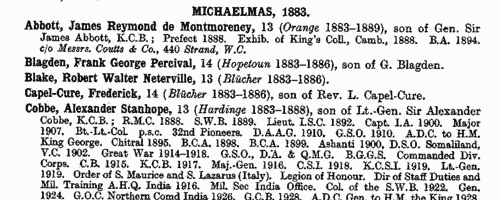
| Missing Next-of-Kin and Heirs-at-Law
(1900)
The Unclaimed Money Registry and Next-of-Kin Advertisement Office of F. H. Dougal & Co., on the Strand in London, published a comprehensive 'Index to Advertisements for Next of Kin, Heirs at Law, Legatees, &c., &c., who have been Advertised for to Claim Money and Property in Great Britain and all Parts of the World; also Annuitants, Shareholders, Intestates, Testators, Missing Friends, Creditors or their Representatives, Claimants, Unclaimed and Reclaimed Dividends and Stock, Citations, Administrations, Rewards for Certificates, Wills, Advertisements, &c., Claims, Unclaimed Balances, Packages, Addresses, Parish Clerks' Notices, Foreign Intestates, &c., &c.' The original list was compiled about 1880, but from materials dating back even into the 18th century: most of the references belong to 1850 to 1880. For each entry only a name is given, sometimes with a placename added in brackets: there may be a reference number, but there is no key by which the original advertisement may be traced. The enquirer of the time had to remit £1 for a 'Full and Authentic Copy of the Original Advertisement, together with name and date of newspaper in which the same appeared'. This appendix to the list was issued in about 1900. | Sample scan, click to enlarge
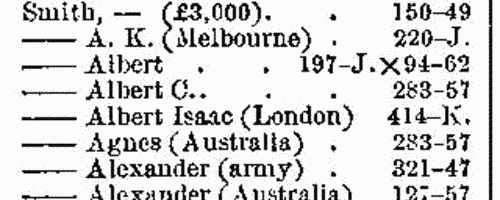
|  Outstanding soldiers of the Royal Artillery
(1881-1901) Outstanding soldiers of the Royal Artillery
(1881-1901)
Each year the best soldiers were chosen for long service and good conduct medals. This register gives rank, name, regimental number, and date of recommendation. (The sample scan is from the East Surrey regiment). The register is essentially a register of recommendations, annotated with details of the issue of the medals. Where no gratuity accompanied the medal, the entry is marked 'W. G.' (without gratuity); where, for one reason or another, the medal was not issued, the entry is marked 'N. S.' (not sanctioned) and struck through. | Sample scan, click to enlarge
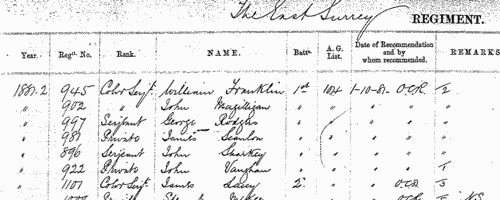
|  Outstanding soldiers of the Royal Irish Regiment
(1881-1901) Outstanding soldiers of the Royal Irish Regiment
(1881-1901)
Each year the best soldiers of the regiment were chosen for long service and good conduct medals. This register gives rank, name, regimental number, and date of recommendation. (The sample scan is from the East Surrey regiment). The register is essentially a register of recommendations, annotated with details of the issue of the medals. Where no gratuity accompanied the medal, the entry is marked 'W. G.' (without gratuity); where, for one reason or another, the medal was not issued, the entry is marked 'N. S.' (not sanctioned) and struck through. The regiment was based on the 18th Regimental District - Clonmel. The 1st battalion embarked for Malta in January 1872: by 1881 it was in Bengal, and was in 1884 transferred to Egypt, taking part in the Nile Expedition and adding "Egypt, 1882", "Tel-el-Kebir" and "Nile, 1884-1885" to the regimental honours, returning 9 September 1885. The battalion moved from England to Ireland in 1891 and was based at Limerick by 1895. In 1899 it was sent out to South Africa, fighting at Belfast, Lyndenburg, Bethlehem, Wittebergen and Colesberg, and adding "South Africa, 1900-1902" to the regimental honours. The 2nd battalion embarked for Malta in 1884, continuing to India, where it took part in the Hazara Expedition of 1888. In 1895 it was based at Jubbulpure. | Sample scan, click to enlarge
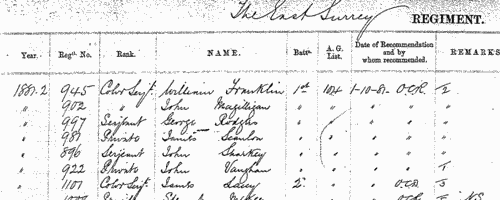
| Unclaimed Naval Prize Money
(1855-1902)
Various prize moneys were awarded to officers and men who served on board her Majesty's ships. For one reason or another a substantial number of these prizes, from as little as a shilling or two to as much as many pounds, remained undistributed by 1902, when this comprehensive list of the unclaimed moneys was printed: it lists unclaimed shares of prize money, slave and pirate bounties, salvage awards, parliamentary grants, gratuities and other moneys distributed by the Admiralty 1855 to 1902, but which omits moneys for service on the China Station during the war of 1856 to 1880, and special gratuities for service in Egypt (1882), Soudan (1884) and Soudan and Nile Expedition (1884-1885), for which there are separate indexes. In each case the sailor's name is given first (surname, then christian name or initials); rank or rating; ship in which serving at time of capture or award; and the amount due. | Sample scan, click to enlarge

|  British artillerymen fighting in South Africa
(1899-1902) British artillerymen fighting in South Africa
(1899-1902)
The Queen Victoria's South Africa Medal was awarded (after her death, in the event) to all who had served honourably in the various campaigns in the Boer War. Returns were made from each unit, and consolidated into nominal roll, of which this is the one for the Royal Artillery. Confusingly, the ledgers used had originally been printed for a register of men transferred (or re-transferred after mobilization) to 1st Class Army Reserve. All the original column headings were therefore struck through, and the roll was prepared with this information: Date of Issue; Regimental Number; Rank; Name; Unit; Medal (a 1 indicating that a medal was awarded); [number of] Clasps; the reference to the source in the original returns, usually starting with AG for papers in the hands of the Adjutant-General, and 68/Art/ for the Royal Artillery records. The final column, normally left blank, was occasionally used for explanatory remarks. | Sample scan, click to enlarge
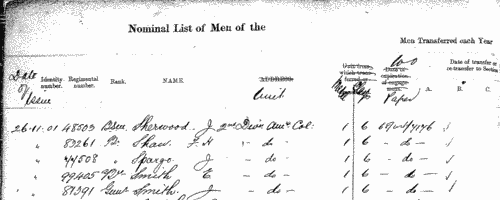
| Boys entering Loretto School
(1902)
The Reverend Dr Thomas Langhorne, who came to Musselburgh in Midlothian as an Episcopalian Church clergyman, established a small school for boarders and day scholars at Loretto House, so called because the grounds contained the ruins of the mediaeval chapel of St Mary of Loretto. To celebrate the centenary of the school in 1925, a second edition of the school register was published, edited by A. H. Buchanan-Dunlop. Relatively little was known of many of the earliest scholars, but from 1835 onwards the register generally gives full name, in capitals, surname first; date of birth; period of time at Loretto; a brief biography; date of death; whether brother of any other boy in the register; and a sequential number. | Sample scan, click to enlarge
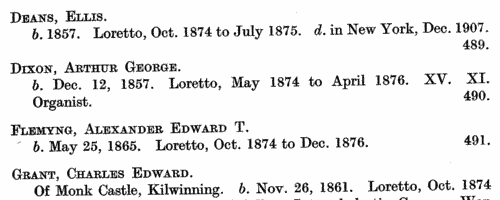
| Boys entering Marlborough College
(1902)
The public school at Marlborough in Wiltshire was founded in 1843. In 1952 this, 9th, edition of the college register was published, being a revision by L. Warwick James of the 8th edition (of 1936): but for the years before 1936 it does not merely repeat the 8th edition, because Warwick James was able to correct the 19th-century entries with information from newly-discovered letters and books from 1843 to 1853, and the school lists from 1844 onwards. The roll is arranged by year, and within each year by term of entrance, and then alphabetically by surname within each term. Each boy is assigned a number within the year: then his name is given, surname first, and, in brackets, his house. The houses within the college were called B1, B2, B3, C1, C2 and C3, and the Lower School (L Sch); the out college houses were Preshute, Priory, Cotton, Hermitage, Littlefield, Barton Hill, Summerfield and Upcot. Then there is given the boy's father's name (surname and initials) and address (at entrance), the boy's date of birth (b) and month of leaving (l). Where the boy represented the school at Rugby football (XV) or cricket (XI), in the rifle corps (VIII, or RC XI), that is indicated. There is a brief summary of achievements in later life, and, where known, and date of death or (in italics) address as in 1952. | Sample scan, click to enlarge
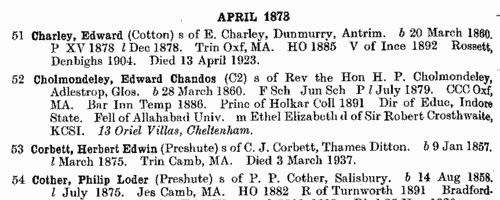
|
Research your ancestry, family history, genealogy and one-name study by direct access to original records and archives indexed by surname.
|












